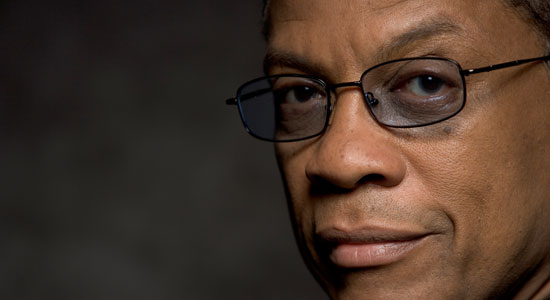
It’s the 31st annual Festival International de Jazz de Montréal. MAGNET’s Mitch Myers translates the action.
As Italian trumpeter Paolo Fresu’s all-star segment of the festival’s Invitation Series wound to a close, I had to admit that this amazing game of musical chairs had its own worldly charm. For his final night, Fresu hosted Norwegian trumpeter Nils Petter Molvaer and French mega-drummer Manu Katché for an evening of dark, swirling improvisation. Both Fresu and Molvaer have an affinity for electronics and often process their horns through a fund of electronic effects. The two began playing without Katché, riffing and darting around one another through an echoing cloud of sonic ambiance. Fresu’s style was more melodic than Molvaer’s, but to a great extent, their dueling horn-play was almost indistinguishable in lieu of the heavy electronic gloss that filled the Gesù Theater. Naturally, things picked up quickly when Katché hit the stage, as his impeccable rhythmic drive forced Fresu and Molvaer back into the moment and the group improvisation truly began. As trumpeters, both Fresu and Molvær owe an artistic debt to Miles Davis, and the processed sound of their respective horns mixed with Katché’s insistent pulse made for a Bitches Brew-type experience: a bubbling, churning cauldron of jazz fusion that pulled the Gesù crowd into rapt engagement. Molvaer was the most experimental, fiddling with a variety of sound backdrops on his laptop and singing into the bell of his horn, which was electronically processed into a ghostly, unintelligible croon. Toward the end of the lengthy set, a lone identifiable melody emerged. It was Molvaer leading a haunting version of “Scarborough Fair.” Katché was as much fun to watch as he was to listen to, and this gig was a harbinger of his own Invitation Series, which is set to begin.
It would be ridiculous to write about jazz this week without noting the recent passing of Chicago saxophonist Fred Anderson, who died on Thursday. Anderson was supposed to play annual New York City avant-garde summit the Vision Festival that night, but was instead honored with 10 minutes of silence, which seems like more than he will get here in Montreal. In related news, trumpeter Bill Dixon also passed away recently, and the two musicians had their share of artistic similarities. Both men were born in the ’20s, and both played key roles in the development of free jazz in the early ’60s. In Chicago, Anderson was one of founders of the AACM (the Association for the Advancement of Creative Musicians). Along with Muhal Richard Abrams and members of the Art Ensemble of Chicago, Anderson helped pioneer the supportive arts community that has inspired generations of musicians since. Dixon followed a similar track in New York, as he helped organize the famed 1964 “October Revolution in Jazz” and also founded the short-lived Jazz Composer’s Guild. Much like Anderson, Dixon was a role model and mentor to many upcoming artists over the years. While not the highest profile, both men were highly respected and came to reach a certain prominence in their golden years, and neither ever stopped playing music. And let us also remember Canadian jazz advocate Len Dobbin, who passed away one year ago during the jazz fest. He died suddenly at a local jazz club surrounded by his friends and family, which was quite shocking at the time. Looking back, Dobbin went out doing what he loved best. Hats off.
Back to the business as hand. In commenting on the presentation of Herbie Hancock’s The Imagine Project, I have to say, for me, it was more disappointing than anything else. Not that it was bad—with backing musicians like drummer Vinnie Colaiuta, bassist Tal Wilkenfeld and guitarist Lionel Louke, it was way too polished and professional to be bad. It just felt like another mainstream move by the ever-popular Hancock. Jumping from funk-filled fusion to bracing acoustic improvisation to his recent Joni Mitchell venture and then finally on to his inspiration-oriented song choices off of the newly released CD, The Imagine Project, Hancock was clearly going for the lowest common denominator, and in an effort to please everybody, he certainly let me down. I also found the maestro’s efforts and comments somewhat patronizing and egocentric, but that’s just Herbie being Herbie. Hancock’s lovely and talented vocalist Kristina Train wore heels so high she could hardly move to the music onstage, and I was bored stiff during the band’s covers of tunes like John Lennon’s “Imagine,” Peter Gabriel’s “Don’t Give Up,” Bob Dylan’s “The Times They Are A’Changin’” (sung by Tal Wilkenfeld!) and the especially ill-chosen version of Bob Marley’s “Exodus.” Auxiliary keyboardist Greg Phillinganes saved the day with his vocals on “A Change Is Gonna Come,” and “Don’t Give Up,” but when the substitute keyboardist from Toto is the high point of a Herbie Hancock show, you know there’s really something wrong. Even the funky encore of “Chameleon” didn’t move me, and the sight (and sound) of Herbie playing the guitar-like keyboard strapped around his neck made me wince. OK, sorry for the sour grapes.
Tomorrow will be another day.






